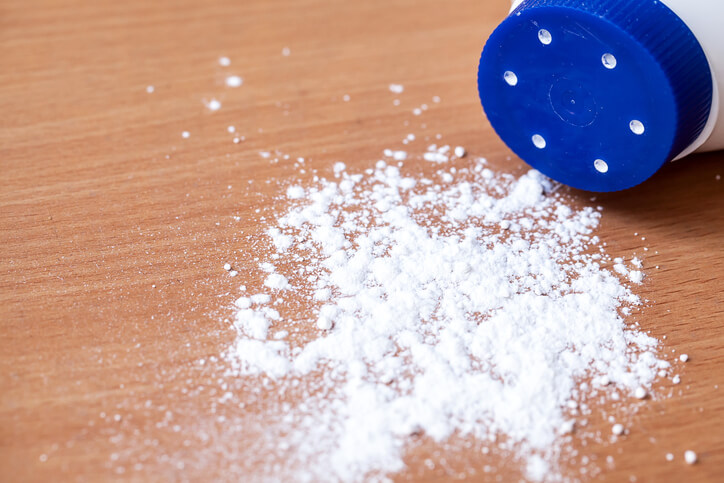Since the early 1970s, scientists searched for a causal link between between talcum powder and ovarian cancer in women. Talcum powder and ovarian cancer lawsuits are now pending across the nation, delivering multimillion-dollar settlements to some victims. Thanks to mounting evidence from talc research, many injured women are getting justice in court. Still, many women don’t understand the risks involved, or the link between talcum powder and ovarian cancer. But if you use baby powder regularly, here’s what you should know about this dangerous link.
Talcum Powder and Ovarian Cancer 101
Baby powder and talcum powder are not entirely synonymous. However, both contain the same active ingredient: talc, a silicate mineral. You’ll also find talc in many cosmetics and dry shampoos, since it absorbs moisture and masks unpleasant odors.
Related: Talcum Powder Increases Ovarian Cancer Risk By 20 to 30 Percent
The word “talcum” stems from talc, which the American Cancer Society says is made primarily of magnesium, silicon and oxygen. So, what’s so harmful about it? While talc once contained asbestos, talcum powder has been free of that particular cancer-causing stuff for quite some time. Asbestos can cause cancer when inhaled, while asbestos-free talc can cause cancer when absorbed directly through the genital area. This is likely because that part of the body offers a direct pathway to internal organs and tissue where it can affect ovary function.
What Other Common Products Contain Talc?
While baby powder is the most likely link between talcum powder and ovarian cancer, other talc-based products raise similar concerns. Several other products that contain talc may come into direct contact with a woman’s genitalia (and eventually, her ovaries). Female hygiene products like sanitary napkins contain traces of talcum powder, while it is also used on contraceptives like diaphragms and condoms.
The movement of talc is relatively straightforward, traveling directly through the vagina through the uterus to the fallopian tubes and the ovaries. While baby powder contains the most talc, condoms and diaphragms can get much closer to a woman’s ovaries. The good news? The talc found in dry shampoo and powder makeup most likely won’t cause ovarian cancer, though its relation to many other forms of cancer has not yet been studied.
Related: Top 10 Talc-Free Baby and Body Powder Products
Talcum Powder and Ovarian Cancer: Certain Body Parts, Application Frequency Lead to Increased Risk
More research is underway to determine how significant the increased risk is, but the International Agency for Research on Cancer classifies the genital use of talcum powder as potentially carcinogenic. Cancer Prevention Research published an analysis in June 2013 called “Genital powder use and risk of ovarian cancer: a pooled analysis of 8,525 cases and 9,859 controls,” and their research concluded that women who use talc-based products for genital hygiene could face a 20-30% increased risk.
The increased cancer risk alone merits concern, but what’s worse is how long these talcum powder sides effects have been known. Research about the connection between talc and ovarian cancer dates back to 1961. Several cancerous ovarian tissue samples have contained talc powder, indicating a strong connection between the two.
Johnson & Johnson allegedly knew about the talcum powder and ovarian cancer link for 50+ years. So why don’t they warn consumers about this risk?
Related: Talc-Free Makeup Brands: We List Our Top 10 Favorites
How Cancer Victims Can Get Justice and Compensation
Are you using currently baby powder or talc-containing products near your genital area? We believe you should stop until researchers can conclusively confirm or deny the talcum powder and ovarian cancer link. Many women who use talcum powder for feminine hygiene are now suing manufacturers like J&J for negligence.
If you used baby powder or other talc-containing products and then developed ovarian cancer, you may have an eligible claim. It’s a good idea to speak to a lawyer who’s familiar with this particular mass tort. An experienced talc lawyer can help you determine whether or not you may qualify for a cash settlement. Not sure where to start? You can fill out a free talcum powder and ovarian cancer claim evaluation form online and get your results in just minutes! If your case appears to qualify, a lawyer will contact you to discuss your case and possible compensation options.
Jared Heath
Jared Heath is the author of The Sound in the Silence. In his role as an SEO content and digital marketing strategist, Jared was directly responsible for managing DrugJustice.com's editorial calendar and published articles on this website from 2015 to 2016. He is now pursuing a new career as a chiropractor.

